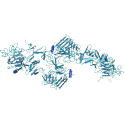
- Remove this product from my favorite's list.
- Add this product to my list of favorites.
Products
Viewed products
Newsletter
 |  |  |  |  |  |

Background
Receptor tyrosine-protein kinase erbB-4 (ErbB4), also known as Her4, is a single-pass type I transmembrane glycoprotein that is a member of the ErbB family of tyrosine kinase receptors. ErbB family members serve as receptors for the epidermal growth factor (EGF) family of growth factors. ErbB4 is expressed in normal skeletal muscle, heart, pituitary, brain and several breast carcinomas. ERBB4 contains multiple furin-like cysteine rich domains, a tyrosine kinase domain, a phosphotidylinositol-3 kinase binding site and a PDZ domain binding motif. The protein binds to and is activated by neuregulins-2 and -3, heparin-binding EGF-like growth factor and betacellulin. Ligand binding induces a variety of cellular responses including mitogenesis and differentiation. Multiple proteolytic events allow for the release of a cytoplasmic fragment and an extracellular fragment. ErbB4 appears to play important roles in neuronal development, development of the heart and cancer. ERBB4 has been shown to interact with: DLG4, NRG1, STAT5A, and YAP1. Mutations in this gene have been associated with cancer. Other single-nucleotide polymorphisms and a risk haplotype have been linked to schizophrenia.
Source
Recombinant Human ErbB4, His Tag (ER4-H5221) is expressed from human 293 cells (HEK293). It contains AA Gln 26 - Pro 651 (Accession # NP_005226.1).
Predicted N-terminus: Gln 26
Molecular Characterization
This protein carries a polyhistidine tag at the C-terminus.
The protein has a calculated MW of 70.7 kDa. The protein migrates as 95-110 kDa under reducing (R) condition (SDS-PAGE) due to glycosylation.
Endotoxin
Less than 1.0 EU per μg by the LAL method.
Purity
>95% as determined by SDS-PAGE.
Formulation
Lyophilized from 0.22 μm filtered solution in PBS, pH7.4 with trehalose as protectant.
Reconstitution
Please see Certificate of Analysis for specific instructions.
For best performance, we strongly recommend you to follow the reconstitution protocol provided in the CoA.
Storage
For long term storage, the product should be stored at lyophilized state at -20°C or lower.
Please avoid repeated freeze-thaw cycles.
This product is stable after storage at:
-20°C to -70°C for 12 months in lyophilized state;
-70°C for 3 months under sterile conditions after reconstitution.
Bioactivity
Please refer to product data sheet.
(1) "Phenotypic Identification, Genetic Characterization, and Selective Signal Detection of Huitang Duck"
Ma, Lin, Yan et al
Animals (Basel) (2024) 14 (12)
(2) "Unveiling the RKIP and EGFR Inverse Relationship in Solid Tumors: A Case Study in Cervical Cancer"
Cardoso-Carneiro, Pinheiro, Fontão et al
Cancers (Basel) (2024) 16 (12)
(3) "Computational and biological approaches in repurposing ribavirin for lung cancer treatment: Unveiling antitumorigenic strategies"
Paudel, Singh, De Rubis et al
Life Sci (2024) 352, 122859
Showing 1-3 of 2582 papers.
Follow us